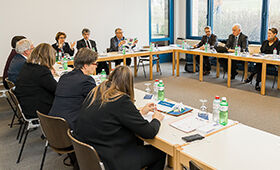The appeal of dual vocational education and training in Germany and Switzerland
SFIVET and BIBB expert workshop in Zollikofen
The attractiveness of dual vocational education and training is under discussion in both countries and was therefore the current theme of an SFIVET/BIBB expert workshop on 23 and 24 November 2017 in Zollikofen/CH led by Prof. Dr. Friedrich Hubert Esser and Dr. Philippe Gnaegi, presidents respectively of the Federal Institute for Vocational Education and Training (BIBB) and the Swiss Federal Institute for Vocational Education and Training (SFIVET), and by the SFIVET Director, Prof. Dr. Cornelia Oertle. An intensive exchange of opinions and information took place with experts from both institutes.

Vocational education and training in both Germany and Switzerland has a strong dual training system organised on the basis of social partnerships. The federal structure which requires cooperation between the federal government and the federal states or cantons is common to both systems. Both partner institutes—the Federal Institute for Vocational Education and Training (BIBB) and the Swiss Federal Institute for Vocational Education and Training (SFIVET)—are therefore in close contact and exchange information on current developments and challenges relating to vocational education and training for both countries.
Attractiveness of vocational education and training is the overarching theme
The issue of the attractiveness of vocational education and training formed the overarching theme—this was in light of the increasing student numbers, the digitalisation trend, and challenges faced as a result of migration and the integration of refugees. The theme of validating non-formal learning was also addressed.
“Given the increasing numbers of students with the higher education entrance qualification, there is increased competition between academic and vocational education and training. One factor determining the future development will be the opportunities for those with vocational qualifications for having vocational careers and attractive jobs,” emphasised BIBB President Esser in his opening statement.
BIBB President Esser: "Given the increasing numbers of students with the higher education entrance qualification, there is increased competition between academic and vocational education and training."
Digitalisation

Joint approaches were identified in the topic area of “digitalisation”. Experts from both institutes anticipate the role and function of trainers to change along with the didactics and methods of teaching and learning. In both countries the training regulations are being systematically reviewed in terms of content changes required. “It is important that the wording of job descriptions is future-oriented,” explains BIBB President Esser. “Economy 4.0 is accelerating job switching and the structural shift towards more services. Changes which become necessary in training content as well as in the tailoring of certain occupations must be undertaken by regulatory work. Basic IT competencies will become more important for all occupations and digital forms of learning will enrich training in the company and school.”
One aspect which Switzerland has experienced is that companies are the drivers of digitalisation. Vocational schools are facing huge challenges. They, and general education schools, now have the task of delivering basic digital competencies.
BIBB President Esser believes that “...digitalisation is the opportunity to make vocational education and training more attractive with the aid of smart companies and smart schools, i.e. effective learning environments with competent trainers and vocational school teachers as well as inter-company training centres fitted with the latest equipment which support small and medium-sized enterprises and encourage innovation quality in training. To achieve this, we particularly need managers who recognise and promote the opportunities of “Vocational Education and Training 4.0” in initial and advanced education and training. Together with the SFIVET, we intend to continue working on the development of vocational education and training and thus also on developing the strong reputation it enjoys internationally.”
Migration

Integration of migrants and refugees represents a challenge to society in both nations and one in which vocational education and training plays a particular role. The top priority in this respect is learning the language. Learning the language of country in a practical context is judged as being more successful than the teaching of language skills in general language courses. This approach has been trialled in pilot projects in Switzerland. Support is to be provided for the additional burden on companies from integration services. However, despite a range of programmes and initiatives, there is only a slow rise in the percentage employed. The German side reported on their experiences with the Recognition Act, the career orientation programme office and the “überaus” office.
Tertiary vocational education and training
In the tertiary sector in particular, Switzerland's education and training policy is heading in a different direction to Germany’s. With the adoption of the Vocational Training Act of 2004 in Switzerland, advanced vocational education and training became legally classified as tertiary training and the so-called “tertiary B” sector was formally introduced. This was intended to emphasize equivalence with academic education and training (Tertiary A). The English title descriptions of advanced training qualifications were introduced last year, in 2016, to support international connectivity and for the purposes of clarity, in particular for the large number of international companies based in Switzerland which have no traditional connection with vocational education and training. A clear separation of vocational tertiary education and training and university-level education and training is favoured. This is in contrast to the development in Germany which is focussed on a mixed approach—with courses of study integrated within training and practice and with the initial pilot projects examining training integrated within a degree. A convergence of the various elements of the tertiary education and training system is seen as a risk to the effectiveness of the tertiary education and training system. Instead the focus is on strengthening the profiles of the different types of tertiary education and training by enhancing their distinguishing characteristics (Swiss Science and Innovation Council (SWIR) 2014: The tertiary stage of the Swiss education and training system).
Validating non-formal learning
Recognition certificates have been developed in Germany as part of the process for recognising competencies acquired abroad. These are not formal vocational qualifications. These have, however, prompted questions regarding the recognition or validation of non-formal or informal learning. In contrast to Germany, Switzerland already has a relevant system in the secondary sector which allows educational performance to be validated. Formal vocational certificates can be acquired in a five-stage process.
Conclusions and outlook

Both institutes want to continue with this form of bilateral meeting “The long-standing cooperation with our partner institute, the SFIVET, and the mutual membership of the research councils by both institutes strengthens and stimulates vocational education and training in both of our countries in a very positive way. I therefore also give my support to our ongoing close collaboration. This is characterized in particular by the intensive sharing of information and ideas by our colleagues working internationally in the BIBB and the SFIVET. This meeting also raises awareness of how many common issues exist. However, especially in terms of the value placed on vocational education and training, we can learn from Switzerland” summarizes Esser.